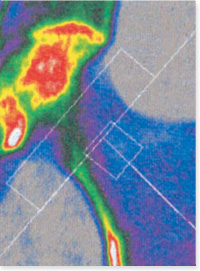- Digital Mammography
- 3D Mammography
- Breast Density
- Breast Ultrasound
- Breast MRI
- Breast Biopsy
- Ultrasound-Guided Breast Cyst Aspiration
- Bone Density (DXA)

Bone Density (DXA)

Women's Services
Bone Density (DXA)
Why is a DXA test done?
A bone density test, called dual-energy x-ray absorptiometry (DXA) or bone densitometry, is done to:
Find out if you have osteoporosis, which involves a gradual loss of calcium, causing the bones to become thinner, more fragile and more likely to break.
Monitor osteoporosis treatment.
What is a DXA test?
A DXA scan is an enhanced x-ray that is used to measure bone density in your hip and spine, and sometimes in other bones. The DXA machine has software that computes and displays the bone density measurements on a computer.
Who should have a DXA scan?
Women should have a DXA scan if:
- You're age 65 or older
- You break a bone after age 50
- You're in menopause and have risk factors for osteoporosis
- You're under age 65 but postmenopausal and have risk factors for osteoporosis
- Risk factors include:
- Family history of osteoporosis
- Low body weight/being small and thin
- Not getting enough calcium and vitamin C
- Not eating enough fruits and vegetables
- Getting too much protein, sodium, and caffeine
- An inactive lifestyle
- Drinking too much alcohol
- Smoking
- Losing weight
Men should also have a DXA scan starting at age 70. If they have risk factors for osteoporosis, they should start at age 50.
You may also need a DXA scan if you have:
- A spine x-ray that shows a break or bone loss Back pain with a possible break in your spine
- Height loss of:
- 1/2 inch or more within one year
- A total of 1 1/2 inches
How often should I get a DXA scan?
- Every two years for routine screening
- About once a year after starting a new osteoporosis medicine
How do I prepare for a DXA test?
No preparation is needed.
What should I expect during the test?
- You'll lie on a padded table.
- The technologist walks into the next room to start the DXA machine.
- You hold still while the technologist takes the pictures. (This is fast and painless.)
How long does a DXA scan take?
Less than 30 minutes.
When will I get the results?
The radiologist will evaluate your images and send a report to your doctor's office within 8-48 hours. Your doctor will discuss the results with you.
